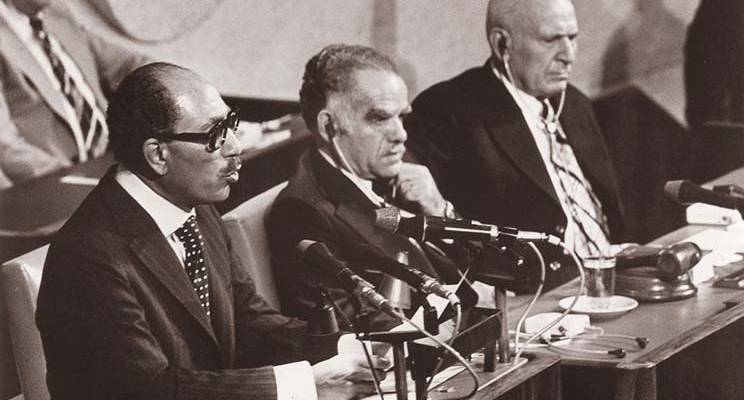This week in Israel’s history, Zionist leader Chaim Weizmann sends a letter to British Secretary Malcolm MacDonald, citing disappointment with Britain’s pro-Arab position, and Egyptian President Anwar Sadat invites Israel’s foreign minister to a meeting in Austria.
July 12, 1938 – Zionist Leadership Sends Letter of Disappointment to Great Britain
As a result of increased violence between Arabs and Jews in British Mandate Palestine in 1936, Great Britain established the Peel Commission. Its purpose was to determine the cause of serious clashes that broke out between the Arabs and the Jews and to make decisions concerning the grievances of both sides.
On July 7, 1937, the Commission reported that the Mandate had become unworkable and recommended the partition of Palestine. This was a change in the official British stance, which had been favorable to the Zionist cause until this point.
The official Arab response was the wholesale rejection of partition “in principle” as they objected to the notion of giving any territory to the Jews for a state. The Arabs stated that “the very presence of Jews enjoying rights was a betrayal of the British word.”
On July 12, 1938, World Zionist Organization President Chaim Weizmann, who later became the first president of the State of Israel, wrote a letter to Malcolm MacDonald, then British Secretary of State for Dominion Affairs. Weizmann expressed his disappointment in the British government for what he said was a clear about-face regarding Zionism and for taking what appeared to be a pro-Arab position, endangering Great Britain’s relationship with Zionist Jewry and British strategic interests.
July 13, 1978 – Egyptian President Urges Meeting with Israeli Foreign Minister
Despite the fact that a conference was planned to take place in less than a week, on July 13, 1978, Egyptian President Anwar Sadat invited Israeli Foreign Minister Ezer Weizmann to a last-minute meeting in Salzburg, Austria.
On November 20, 1977, Sadat made history when he became the first Arab leader to make an official visit to Israel. In Jerusalem, he met with Prime Minister Menachem Begin and spoke at the Knesset on how to achieve a comprehensive peace in the Arab-Israeli conflict.
The reason for this hasty invitation was a sense of urgency on the part of the Egyptian president, who was eager to finalize an agreement with Israel. In the intervening several months, many points of what would become the Camp David Accords were being drafted by US State Department officials, but Sadat wanted to reach an agreement before going to the table at the Camp David Summit, scheduled for September.
By: Penina Taylor, United with Israel
Sign the Declaration to Keep Jerusalem United
Jerusalem Must Remain the United Capital of Israel
I declare that Jerusalem is the eternal capital of the Jewish People and support all efforts to maintain and strengthen a united Jerusalem as the undivided capital of the State of Israel.

